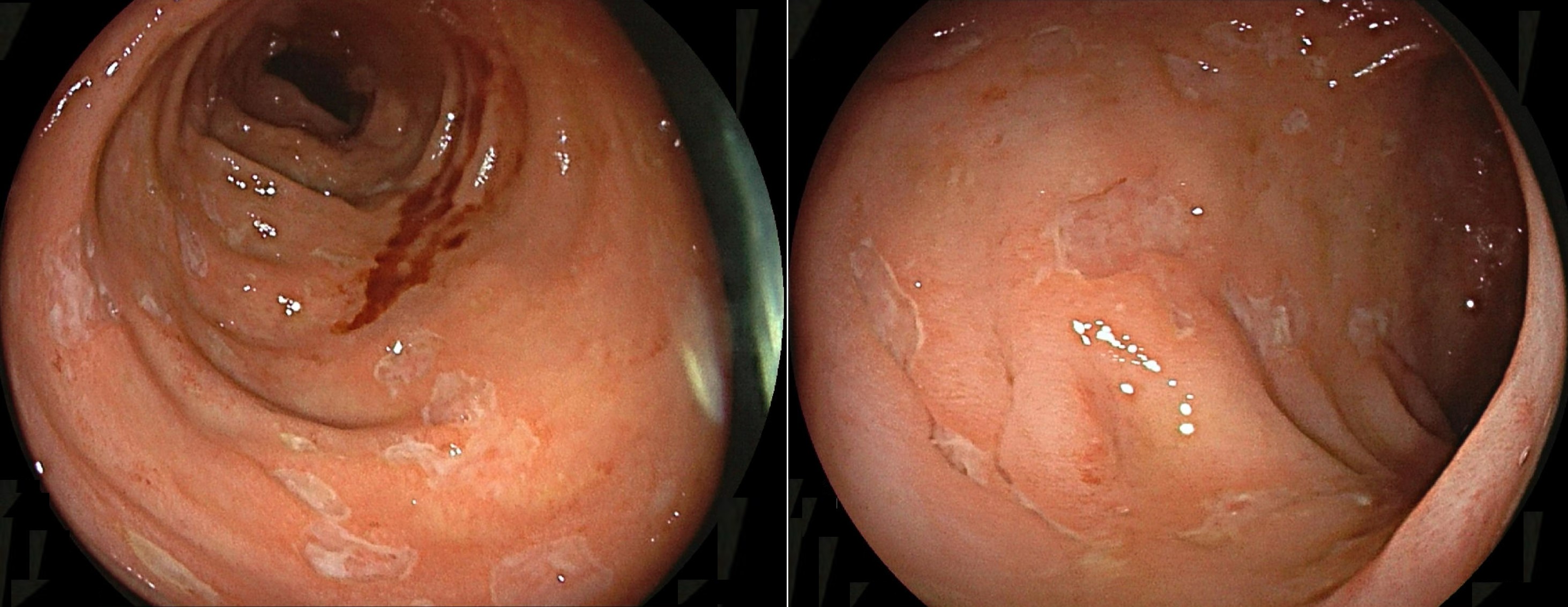Sunday Poster Session
Category: IBD
P1263 - Crohn's Disease Unmasked by Immune Reconstitution Inflammatory Syndrome
Sunday, October 26, 2025
3:30 PM - 7:00 PM PDT
Location: Exhibit Hall
- CM
Cesar Moreno, MD (he/him/his)
University of South Alabama Health Systems
Mobile, AL
Presenting Author(s)
Cesar Moreno, MD1, Mary C. Marshall, MD2
1University of South Alabama Health Systems, Mobile, AL; 2University of South Alabama, Mobile, AL
Introduction: The immune reconstitution inflammatory syndrome (IRIS) describes the response of a restored immune system to a trigger such as occult infection, quiescent autoimmune disease or a known condition that was previously controlled. Generally, IRIS occurs in patients with human immunodeficiency virus (HIV) after starting antiretroviral therapy (ART). IRIS unmasking inflammatory bowel disease is exceedingly rare. We present the case of a 48-year-old female with HIV who developed chronic diarrhea after starting ART with subsequent diagnosis of Crohn’s disease.
Case Description/
Methods: A 48-year-old female with recent diagnosis of HIV presented to the emergency department with diarrhea and unintentional weight loss. The onset of symptoms was 8 months prior shortly after starting bictegravir/emtricitabine/tenofovir alafenamide for HIV treatment. The patient did not have a previous diagnosis of inflammatory bowel disease (IBD). She had bidirectional endoscopy two years prior without evidence of IBD.
Laboratory workup showed elevated C-reactive protein (13.2 mg/dL), iron deficiency anemia, and a CD4 absolute count of 1,133 cells/µL. Broad stool infectious workup was negative. Abdominal imaging showed transverse and descending colon wall thickening with adjacent lymphadenopathy and mesenteric stranding suggestive of colitis. Bidirectional endoscopy revealed multiple ulcers throughout the colon (figure 1). Biopsy results showed chronic active gastritis and duodenitis with rare granuloma and chronic active colitis with ulcers and rare granuloma. The findings were consistent with active Crohn's disease. The patient was started on adalimumab with improvement of her symptoms and normalization of inflammatory markers.
Discussion: This case highlights a patient with HIV and previously undiagnosed Crohn’s disease who developed progressive gastrointestinal symptoms after initiation of ART consistent with IRIS. Incidence of IRIS in patients with HIV ranges from 10-25% and opportunistic infections are most frequently unmasked. IBD, as a manifestation of IRIS, is rare. Clinicians should maintain a high degree of suspicion for IBD in patients who develop persistent diarrhea, anemia or weight loss after ART initiation especially when infectious workup is negative. Management should center on careful balancing of ART, IBD therapies and opportunistic infection evaluation.

Figure: Figure 1. Ulcers throughout the colon. Simple Endoscopic Score for Crohn’s Disease of 22.
Disclosures:
Cesar Moreno indicated no relevant financial relationships.
Mary Marshall indicated no relevant financial relationships.
Cesar Moreno, MD1, Mary C. Marshall, MD2. P1263 - Crohn's Disease Unmasked by Immune Reconstitution Inflammatory Syndrome, ACG 2025 Annual Scientific Meeting Abstracts. Phoenix, AZ: American College of Gastroenterology.
1University of South Alabama Health Systems, Mobile, AL; 2University of South Alabama, Mobile, AL
Introduction: The immune reconstitution inflammatory syndrome (IRIS) describes the response of a restored immune system to a trigger such as occult infection, quiescent autoimmune disease or a known condition that was previously controlled. Generally, IRIS occurs in patients with human immunodeficiency virus (HIV) after starting antiretroviral therapy (ART). IRIS unmasking inflammatory bowel disease is exceedingly rare. We present the case of a 48-year-old female with HIV who developed chronic diarrhea after starting ART with subsequent diagnosis of Crohn’s disease.
Case Description/
Methods: A 48-year-old female with recent diagnosis of HIV presented to the emergency department with diarrhea and unintentional weight loss. The onset of symptoms was 8 months prior shortly after starting bictegravir/emtricitabine/tenofovir alafenamide for HIV treatment. The patient did not have a previous diagnosis of inflammatory bowel disease (IBD). She had bidirectional endoscopy two years prior without evidence of IBD.
Laboratory workup showed elevated C-reactive protein (13.2 mg/dL), iron deficiency anemia, and a CD4 absolute count of 1,133 cells/µL. Broad stool infectious workup was negative. Abdominal imaging showed transverse and descending colon wall thickening with adjacent lymphadenopathy and mesenteric stranding suggestive of colitis. Bidirectional endoscopy revealed multiple ulcers throughout the colon (figure 1). Biopsy results showed chronic active gastritis and duodenitis with rare granuloma and chronic active colitis with ulcers and rare granuloma. The findings were consistent with active Crohn's disease. The patient was started on adalimumab with improvement of her symptoms and normalization of inflammatory markers.
Discussion: This case highlights a patient with HIV and previously undiagnosed Crohn’s disease who developed progressive gastrointestinal symptoms after initiation of ART consistent with IRIS. Incidence of IRIS in patients with HIV ranges from 10-25% and opportunistic infections are most frequently unmasked. IBD, as a manifestation of IRIS, is rare. Clinicians should maintain a high degree of suspicion for IBD in patients who develop persistent diarrhea, anemia or weight loss after ART initiation especially when infectious workup is negative. Management should center on careful balancing of ART, IBD therapies and opportunistic infection evaluation.

Figure: Figure 1. Ulcers throughout the colon. Simple Endoscopic Score for Crohn’s Disease of 22.
Disclosures:
Cesar Moreno indicated no relevant financial relationships.
Mary Marshall indicated no relevant financial relationships.
Cesar Moreno, MD1, Mary C. Marshall, MD2. P1263 - Crohn's Disease Unmasked by Immune Reconstitution Inflammatory Syndrome, ACG 2025 Annual Scientific Meeting Abstracts. Phoenix, AZ: American College of Gastroenterology.
